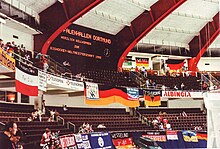 View of Westfalenhalle during the tournament | |
| Tournament details | |
|---|---|
| Host country | |
| Venue(s) | 2 (in 2 host cities) |
| Dates | 18 April – 2 May |
| Teams | 12 |
| Final positions | |
| Champions | |
| Runner-up | |
| Third place | |
| Fourth place | |
| Tournament statistics | |
| Games played | 41 |
| Goals scored | 235 (5.73 per game) |
| Attendance | 226,379 (5,521 per game) |
| Scoring leader(s) | |
The 1993 Men's Ice Hockey World Championships was the 57th such event sanctioned by the International Ice Hockey Federation (IIHF). Teams representing 32 countries participated in several levels of competition, with an additional six national teams failing to advance from mid-season preliminary qualifying tournaments. The competition also served as qualifications for group placements in the 1994 competition.
The top Championship Group A tournament took place in Germany from 18 April to 2 May 1993, with games played in Munich and Dortmund. Twelve teams took part, with the first round being split into two groups of six, with the four best teams from each group advancing to the quarter-finals. Russia beat the reigning world champions Sweden to win the World Championships for the first time since entering competition after the dissolution of the Soviet Union at the end of 1991.[1] The bronze medal was won by the Czech Republic, defeating Canada in their first major tournament as an independent country after their split with Slovakia at the beginning of the calendar year.
While Latvia had last competed in 1939, this year marked the World Championship debut of three national teams. Kazakhstan, Slovenia, and Ukraine, played for the first time, in Group C. Belarus, Croatia, Estonia, and Lithuania all did not make it out of the autumn qualifiers and had to wait at least another year. Also waiting until the following year was Slovakia, who made their World Championship debut in Group C1 in 1994. The official mascot of this tournament was Bully the penguin.
Eleven of the twelve openings for the Lillehammer Olympics were established in Group A. Switzerland, by being relegated, was excluded, and the final nation had to qualify in a tournament the next fall. The top two teams from Group B, the Group C champion, the top Asian nation, and Slovakia all were given the opportunity to fill the final vacancy.[2]
- ^ Podnieks pg.15. Note that the IIHF encyclopedia does not group Russian and Soviet Union medals in ice hockey, however their writers often do, which would make this their 23rd title.
- ^ Olympic qualifier